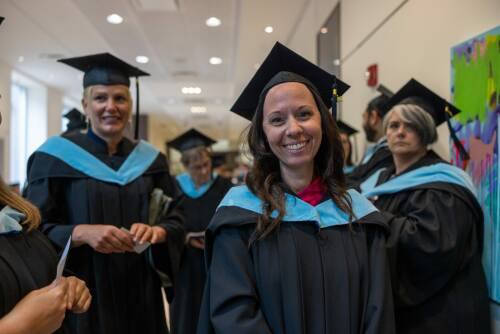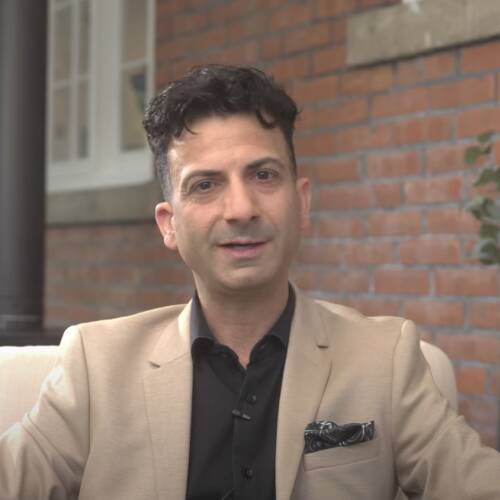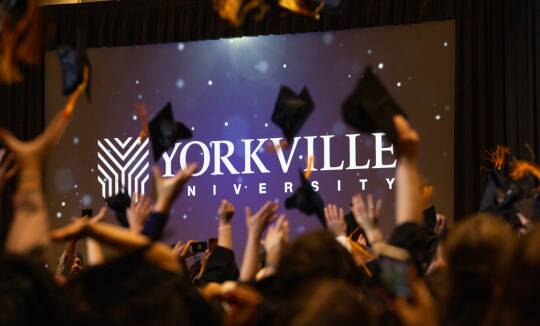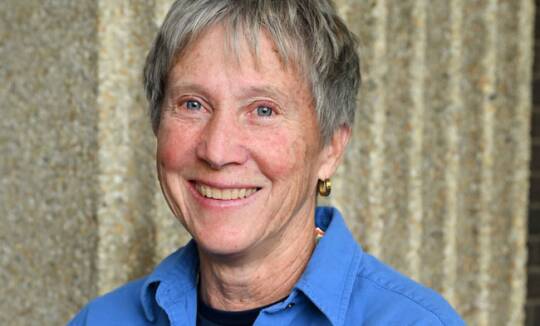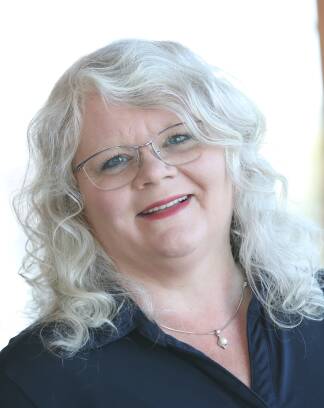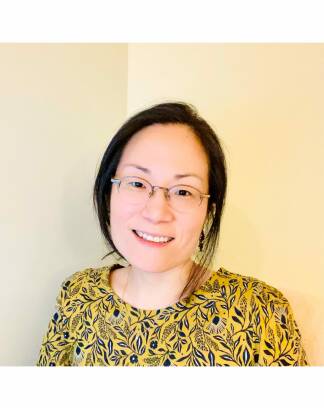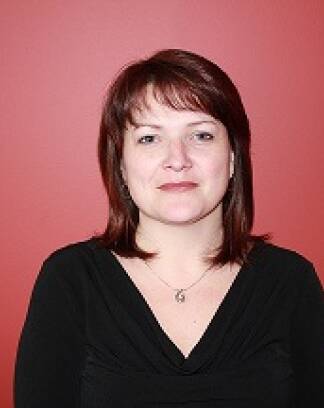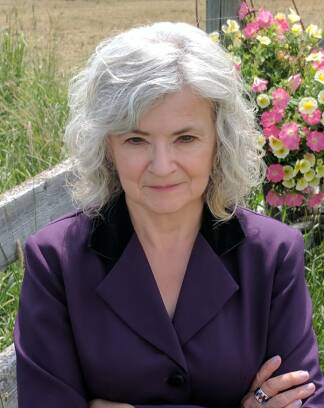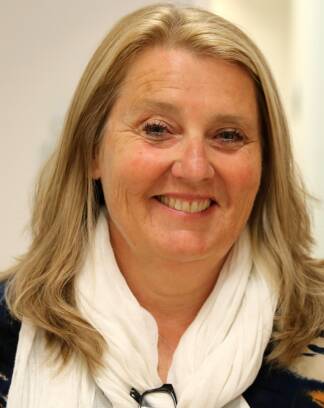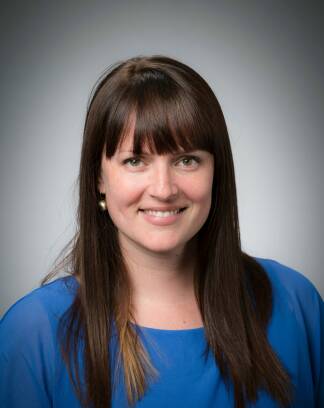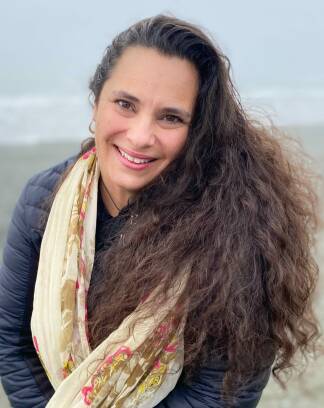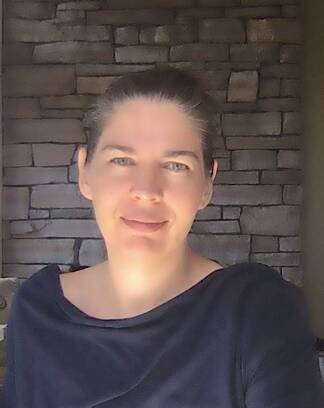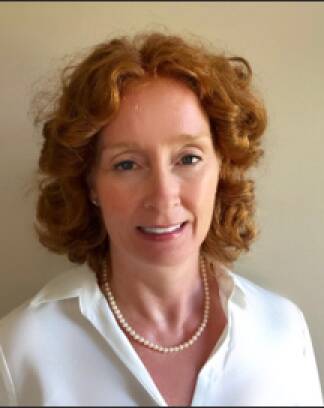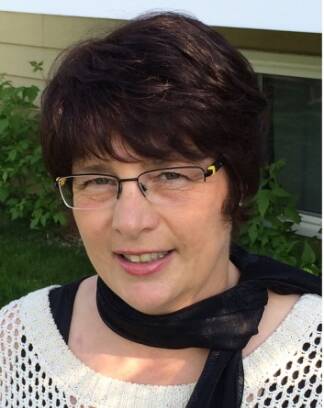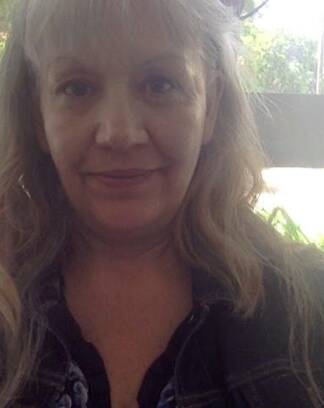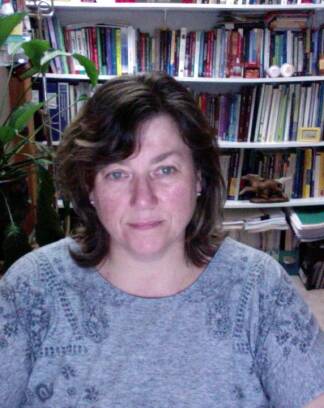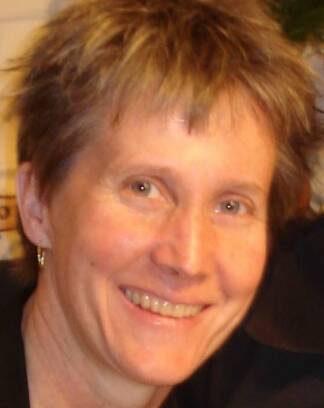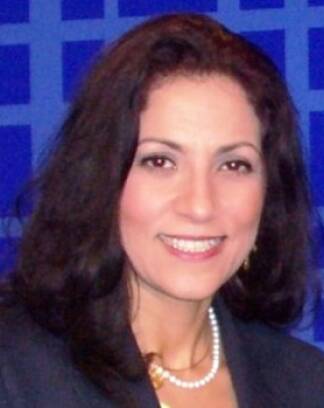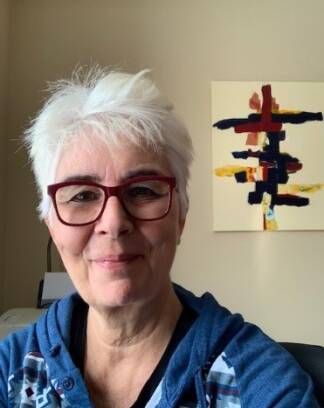
Master of Education in Adult Education (Online)
Making a Difference With Education
The power of education meets the passion for making a difference at our Master of Education in Adult Education.
Tailored for those engaged in adult education, including post-secondary education administration, this online degree propels you to become an expert in adult learning.
Our comprehensive program goes beyond theory, encouraging you to critically reflect on personal experiences to bridge the gap between theory and practice.
By fostering a deep understanding of adult education principles, we equip you with the tools to address real-world challenges.
Emerge not only as experts in adult learning theory and practice, but also as reflective practitioners capable of making meaningful contributions to the field and the growth of adult learners.

18
Students per class
3
Start dates per year
New Term Starts Soon
Starts:
January, May, September
Campus:
Fully Online
Duration:
As few as 2 years*
*With full course load, year-round study and/or approved transfer credits. Contact an Admissions Advisor for more information.
Program Benefits
Career Outcomes
Graduates of the Master of Education in Adult Education program apply their new skills and knowledge to help adults achieve their lifelong learning goals and transform their lives.
A variety of exciting and fulfilling outcomes are available to graduates of this program, in settings such as:
-
Universities
-
Colleges
-
Polytechnic Institutions
-
Armed Forces
-
Training Departments
-
Social Work
-
Emergency Response
-
Organizational Development
-
Human Resources
Where Our Graduates Work












Faculty
Meet the Dean

Sepideh Mahani
Interim Dean, Faculty of Education
Dr. Sepideh Mahani is the Interim Dean, Faculty of Education at Yorkville University. She has been a member of Yorkville University faculty since 2016 and served as the Associate Dean (Education) and Chair of Educational Leadership from 2018 to 2024. With over 20 years of experience in K-12 and higher education, Dr. Mahani has worked as an educator in various national and international contexts. Her academic journey began with a Bachelor’s degree in Political Science, followed by a Master’s and Ph.D. in Educational Leadership. Dr. Mahani is deeply committed to fostering inclusive, innovative, and research-driven teaching practices. Her research interests encompass a broad range of topics, including social justice, diversity in education, humanizing pedagogy, culturally responsive teaching, first-generation students, and gender equality in education. Her work has been published in numerous academic journals and books, such as Qualitative Inquiry, The Journal of First-Generation Student Success, Cultural and Pedagogical Inquiry, and The Journal of International Education Research. She also co-authored Sister Scholars: Untangling Issues of Identity as Women in Academe, published by DIO Press in 2021. Currently, she is engaged in research on culturally responsive teaching practices in online environments.
Research Interests: critical qualitative inquiry, reflexive inquiry, social justice, diversity in education, culturally responsive and relevant pedagogy and gender equality in education.
Meet the Faculty
Admission Requirements
Yorkville University’s Master of Education program is 100 percent online.
The Master of Education online degree is administratively offered by our Fredericton campus.
Applicants to the Master of Education program are required to provide the following:
- Official undergraduate transcript and proof of obtainment of a bachelor’s degree*
- Resume and statement of interest
- Detailed course descriptions if applying for transfer credits
- Two letters of reference from professional or academic sources
- Completed online application
- Application fee of $150 (CAD)
*All official transcripts need to be sealed, stamped and sent directly from the issuing institution to our Admissions Services Department for evaluation.
In addition, applicants are required to have:
- A cumulative grade point average (CGPA) in undergraduate study of at least 3.0 on a 4.0 or 4.3 scale, or a GPA of at least 3.0 on the final 60 undergraduate credits taken. Applicants may be conditionally admitted with a GPA between 2.5 and 2.99 if strength of overall application is sufficient.
- Two or more years of relevant employment in education or an education-related field. In some cases, relevant volunteering work in community-based activities may be considered. Preference will be given to applicants with an undergraduate degree in education or a field related to their field of study.
Applicants who do not meet the standard admissions requirements may be considered for admission under the Faculty of Education’s Flexible Admissions Policy. Yorkville University reserves the right to refuse admission or ask admitted students to withdraw from the program in special circumstances.
For full details of admissions requirements, please contact an Admissions Advisor.
To fill out the details of your reference for admission to our Master of Education in Adult Education degree, click here.
English Language Requirements
English is the primary language of instruction at Yorkville University.
Applicants whose native language is not English and who have obtained a bachelor’s degree in a language of instruction other than English must prove proficiency in one of the following ways:
- Proof of obtaining a bachelor’s or first professional degree where English is the language of instruction
- Confirmation of a Canadian Academic English Language – Computer edition (CAEL-CE) with a score of at least 70 (No component proficiency score below 60).
- Confirmation of an official Test of English as a Foreign Language (TOEFL) score of 95 (Internet-based version).
- Confirmation of a Canadian Language Benchmark (CLB) overall score of 9 (No component score below 8).
- International English-Language Test System (IELTS) with an overall bandwidth of 7.0.
- Confirmation of a Canadian Test of English for Scholars and Trainees (CanTest) with a minimum overall bandwidth of 4.5.
- Confirmation of a score on any other test of English language proficiency that equates to Level C1 or higher of the Common European Framework of Reference for Languages (CEFR).
- Confirmation of a score equivalent to these scores on another test of English language proficiency recognized by and acceptable to the University.
- Confirmation of a Duolingo minimum score of 130 (No subscore below 120).
- Confirmation of Pearson Test of English (PTE) Academic score of 65 (no skills area score below 55)
Canadian applicants who completed their qualifying bachelor’s degree in French, but completed another post-secondary degree, certificate, or diploma or their secondary education in English, are exempted from the requirement to provide tested confirmation of English language proficiency.
The University reserves the right to refuse admission to any student whose proficiency of English is questionable and to ask any student whose written work is below acceptable standards to withdraw from the program.
Have any questions? Please contact an Admissions Advisor.
Tuition and Fees
Program Description
We recognize the diverse aspirations of our students and offer two pathways: course-based for those focused on professional learning outcomes and research-based for passionate researchers and doctoral candidates. To make the program truly individualized, students can take any of our available M.Ed. elective courses, irrespective of their chosen specialization or pathway.
Master of Education in Adult Education
| Course-based Pathway | Research-based Pathway |
|---|---|
| EDAE 6323: Foundations of Adult Education | EDAE 6323: Foundations of Adult Education |
| EDUC 6013: Research in Education | EDUC 6013: Research in Education |
| EDAE 6303: Contexts of Adult Learning | EDAE 6363: Diversity in Adult Education |
| EDUC 6123: Reflexive Inquiry | EDUC 6093: Advanced Research Methods in Education |
| EDAE 6363: Diversity in Adult Education | EDUC 7000: Graduate Research Thesis |
| EDAE 6343: Program Development and Planning | |
| EDUC 6083: Self-directed Inquiry | |
| Plus 3 Electives (9 Credits) | Plus 2 Electives (6 Credits) |
Master of Education in Educational Leadership: Educational Administration
| Course-based Pathway | Research-based Pathway |
|---|---|
| EDEL 6113: Educational Leadership: Perspectives and Practices | EDEL 6113: Educational Leadership: Perspectives and Practices |
| EDUC 6013: Research in Education | EDUC 6013: Research in Education |
| EDUC 6063: Assessment and Evaluation in Education | EDEL 6193: Diversity and Leadership |
| EDUC 6123: Reflexive Inquiry | EDUC 6093: Advanced Research Methods in Education |
| EDEL 6193: Diversity and Leadership | EDUC 7000: Graduate Research Thesis |
| EDEL 6223: Supervision of Instruction | |
| EDUC 6083: Self-directed Inquiry | |
| Plus 3 Electives (9 Credits) | Plus 2 Electives (6 Credits) |
Master of Education in Educational Leadership: Leadership in Learning
| Course-based Pathway | Research-based Pathway |
|---|---|
| EDUC 6043: Learning and Organizations | EDUC 6043: Learning and Organizations |
| EDUC 6013: Research in Education | EDUC 6013: Research in Education |
| EDEL 6193: Diversity and Leadership | EDEL 6193: Diversity and Leadership |
| EDUC 6123: Reflexive Inquiry | EDUC 6093: Advanced Research Methods in Education |
| EDEL 6153: Ethical Leadership | EDUC 7000: Graduate Research Thesis |
| EDEL 6143: Change and Transformation | |
| EDEL 6083: Self-direct Inquiry | |
| Plus 3 Electives (9 Credits) | Plus 2 Electives (6 Credits) |
Graduate Certificate in Education: Teaching and Learning
| GCE: Teaching and Learning |
|---|
| EDAE 6323: Foundations of Adult Education |
| EDAE 6343: Program Development and Planning |
| EDUC 6063: Assessment and Evaluation in Education |
| EDAE 6513: Becoming a Critically Reflective Educator |
| 1 Elective |
Graduate Certificate in Education: Leadership in Social Justice
| GCE: Leadership in Social Justice |
|---|
| EDUC 6003: Indigenous Perspectives in Canadian Education |
| EDEL 6153: Ethical Leadership |
| EDEL 6443: Curriculum as Living Inquiry |
| EDEL 6193: Diversity in Leadership |
| 1 Elective |
Course Descriptions
The rigorous curriculum of the Master of Education in Adult Education includes the following courses:
3 Credits (required)
Contexts of Adult Learning introduces students to the contexts of adult education and investigates what it means to be learning in a number of different contexts. The situational aspect of learning will be central to the enquiry and students will take a close look at formal and informal learning, networked learning, experience and game-based learning, community-based learning, learning in communities of practice, and learning in communities of interests. These learning contexts will lead students not only to social movement theory, with a particular focus on the local community, the workplace, the home, the voluntary sector, but also to theories of self-direction and connectivism as might be most obvious in relatively new online learning spaces. Students will explore how the learning and knowledge-generating capacities of such spaces will affect their success.
3 Credits
Foundations of Adult Education presents an overview of the major societal purposes of adult education by exploring and examining the conceptual, historical, and philosophical foundations that inform current practices in the field. Students are encouraged to examine the relationship between theory and practice, and to identify their own ideas and practices in relation to these theories and practices.
3 Credits
Program Development and Planning provides a theoretical and conceptual foundation in contemporary approaches to program development and planning for adult learners. Students apply newly acquired knowledge and skills in designing a program. Topics include: designing and developing programs; assessing needs; setting learning objectives and outcomes; designing instructional plans; and developing evaluation strategies.
3 Credits
Diversity in Adult Education addresses how adult education programs understand and respond to different cultural contexts. Through selected readings, weekly discussions, and assignments, students will develop a greater understanding of diversity as a social construction in relation to the concepts of social identity and social location. The specific areas of diversity included in this course are: identity and intersectionality; privilege and power; race and ethnicity; gender and sexual orientation; Indigenous knowledge; inclusiveness and universal design for learning; and globalization and adult learning.
3 Credits
Learning and Teaching Online explores the theory underlying the development and application of new interactive educational technologies, how they might fit with instructional design, learning and assessment strategies, and infrastructures. The course provides hands-on experience with a range of learning technologies and enables students to explore the processes of designing, implementing, and critiquing technology-based learning. The course will introduce students to current debates around the concept of openness. By the end of the course, students will have developed the ability to act as creative and critical professionals within the broad field of technology-based learning, teaching, and training.
3 Credits
Transformative Learning in Adult Education involves an examination of transformative learning. This course will help students to understand what transformative learning is, distinguish it from other forms of learning, and foster it in their practice. The course will cover five broad areas: history, theory, research, practice, and future perspectives of transformative learning.
3 Credits
This course involves the examination of a variety of teaching and facilitating approaches that enhance the adult learning experience in individual or group settings. Topics include: teaching styles; creating motivating learning environments; ethical concerns in teaching adults; guidelines for selecting teaching methods; the use of technologies for teaching; and the assessment of teaching performance.
3 Credits
Adult Education for Sustainability and Global Citizenship is designed to provide students with the knowledge and skills to integrate with depth and creativity the principles of sustainability and global consciousness into classrooms, colleges, and community contexts. Students will explore sustainable development and global citizenship to understand their alignment with adult education theory and practice, in particular affective and dialogic learning, inclusivity, and systemic thinking.
3 Credits
Coaching and Mentoring in Adult Education will introduce students to coaching and mentoring strategies that they can utilise in their workplaces. Students will learn about the underlying theory as well as explore current models. They will also be encouraged to reflect on what coaching and mentoring strategies may work best for them and their organisation. This course will aid students in helping others toward continuous professional development.
3 Credits
Indigenous Perspectives in Canadian Education introduces students to the history of Indigenous education in Canada, Indigenous pedagogies and epistemologies, decolonization in education, while encouraging students to think about their own roles in reconciliation through the lens of education. Through selected readings, weekly discussions, and assignments, students will develop a greater understanding of the traditional, historical, and contemporary roles of education in the lives of Indigenous Peoples in Canada. Because the course readings include studies that draw upon Indigenous or Indigenous-informed methodologies, students will also be introduced to some ways that Indigenous methodologies are used in educational research.
3 Credits
Research in Education introduces students to different research approaches, including quantitative, qualitative, mixed methods, arts-based, and community-based participatory research. The primary focus of this course is to help students understand research terminology, critically evaluate published research, and develop an understanding of different methodologies that are best suited for investigating different types of research questions. Research methods, information gathering strategies, and analysis procedures are also explored.
3 Credits
Learning and Organizations provides an opportunity for students to examine the emergence of the learning organization and explore ways to build sustainable learning dynamics and foster spaces where people flourish. Attention will be given to the ways knowledge management and technology help organizations become learning organizations.
3 Credits
Assessment and Evaluation in Education allows students to explore various diagnostic, formative, and summative methods from both theoretical and practical perspectives. Students will learn how to develop and use assessment to promote student learning within a positive knowledge-curation culture (i.e., classroom, department, working unit, etc.). A focus on how to build efficacious and self-regulated learners through pedagogical assessment strategies that utilize accurate and ethical interpretation will be a focus. Students will also explore and differentiate between assessment and evaluation principle for both individual and program performance. A final culminating learning experience will be to reflect upon an assessment and evaluation of architecture that aligns to an area of professional interest.
3 credits
(prerequisite completion of first 9 courses in program of study)
Self-Directed Inquiry is designed to be the culmination of the Master of Education journey for students in the course-based pathway. It requires students to explore a specific area of research interest relevant to their field and to the designation that they are seeking. With the support of teaching faculty and each other, students will engage in discussions and assignments that support self-directed professional inquiry and their own professional learning. As such, students will focus equally on the demonstration of two competencies: conceptualizing, designing, and presenting a research inquiry that evidences criticality and creativity, individualized expression, and capacity to inform praxis; and the ability to communicate effectively at a level commensurate with graduate education. Not available as an elective in research-based program streams.
3 credits
(prerequisites: completion of first 5 courses in program of study and cGPA of 3.70 or higher)
Advanced Research Methods in Education encourages students to explore the broad and deep possibilities for inquiry within critical, community-based, arts-integrated, qualitative, and quantitative research. Connecting rigour to researcher consciousness through reflexive inquiry, students will begin to think about situating themselves theoretically (ontologically, epistemologically, and methodologically) in the context of potential research topics of interest. Engaging with scholarly discourse and critical dialogue, students will extend their capacities from evaluating published research to preparing to conceptualize, conduct, and analyze their own research. Not normally available as an elective in course-based program streams.
3 Credits
Reflexive Inquiry begins from the notion that our lived experiences inform the ways we come to knowledge just as they influence how we engage with each other and the world. In providing students with an opportunity to examine the space between binaries like theory/practice, self/other, and teacher/learner, this course engages dialogic inquiry to cultivate social consciousness, foster accountability, and support ongoing professional development. Students are offered a range of assessment choices, including traditional academic essay, orality, visual curation, technology-based, and arts-informed evaluation.
3 Credits
Decolonizing and Indigenizing Curriculum, Teaching, and Learning guides students to deconstruct colonial ideologies and dismantle structures that perpetuate privileging Western thought and approaches. In seeking to surface pedagogical biases that impact Indigenous ways of being, students learn to develop programs of study, curricula, and services that include Indigenous knowledges, perspectives, values, and cultural understandings in pedagogy, policy and daily practice.
Indigenous Pedagogies and Ways of Knowing examines Indigenous systems of teaching and learning from the perspective of Indigenous education, scholarship and research, and Indigenous knowledge holders and community members. Learners will gain deeper level understanding of the critical significance of orality, storytelling, Indigenous languages, Indigenous literature and Indigenous arts to curricula and programs of study. Holistic and lifelong learning, experiential, land and place-based, trauma-informed, and strengths-based pedagogies will be explored from within an intercultural ethical space of Indigenous relationality. Educators are encouraged to identify and create alternative approaches to facilitate and strengthen access and inclusion of Indigenous pedagogies and ways of knowing into instructional methods, evaluation, and assessment, in systems of education in school, classroom and community environments.
3 Credits
Educators will explore building and strengthening of relationships in Indigenous education at the intersection of Indigenous, settler and immigrant knowledge and experience. Individual and collective roles, attitudes and behaviours, responsibility and representation are examined in the context of processes of colonization, decolonization and resurgence, hegemony, power and privilege, access, inclusion, and accountability, in systems of education. Guided by Indigenous principles and reconciliation framework, students will engage and collaborate in processes of envisioning decolonization and Indigenization within an ethical space of Indigenous relationality to build authentic respectful intercultural relationships in education curricula, programming, and policy.
3 Credits
Contexts of Adult Learning introduces students to the contexts of adult education and investigates what it means to be learning in a number of different contexts. The situational aspect of learning will be central to the enquiry and students will take a close look at formal, informal and open learning, networked learning, experiential, simulation, and place-based learning, community-based learning, learning in communities of practice; and learning in communities of interests. These learning contexts will lead students not only to social learning theory, with a particular focus on the local community, the workplace, the home, the voluntary sector, but also to theories of self-direction and connectivism as might be most obvious in relatively new online learning spaces. Students will explore how the learning and knowledge-generating capacities of such spaces will affect their success.
12 Credits
(prerequisite: six courses in program of study with minimum cGPA of 3.70)
Guided by a thesis supervisor and supported by a committee of two additional faculty members, each student enrolled in the research-based pathway will undertake an original scholarly contribution based on research conducted while in program. The thesis must demonstrate that the student is acquainted with the published literature in the subject of the thesis, that appropriate research methodology has been used, and that appropriate levels of critical analysis have been applied. The thesis will be subject to external evaluation.
As EDUC 7000 is a multi-term course, the course code for each term will be noted sequentially (EDUC7001, EDUC7002, etc.).
3 Credits
Educational Leadership: Perspectives and Practices is a foundational course that is attentive to the ways theoretical knowledge and applied practice can inform each other. A prerequisite for further studies in the field, it explores major theoretical perspectives on leadership in relation to current practices in educational administration and leadership.
3 Credits
Change and Transformation prepares students to successfully manage and champion personal, professional, and organizational change. Collaborative and interest-based approaches are foundational as are discussions of dynamic change theory and the avoidance of change fatigue.
3 Credits
Ethical Leadership uses tenets of critical pedagogy and ethics to help students develop as critically conscious leaders guided by the notion that education can simultaneously foster the cultivation of intellect and a commitment to socially just practices.
3 Credits
Administrators as Leaders focuses on developing leadership and managerial skills in school administrators. Particular attention is given to instructional leadership, developing clear, compelling, shared, and supported visions, and encouraging cultures of ongoing learning and professional development.
3 Credits
Diversity and Leadership uses selected readings, weekly discussions, and assignments, to help students develop a greater understanding of diversity as a social construction in relation to the concepts of social identity and social location. The specific areas of diversity included in this course are: identity and intersectionality; privilege and power; race and ethnicity; gender and sexual orientation; multiculturalism; inclusiveness and universal design for learning; and globalization and leadership.
3 Credits
Supervision of Instruction introduces students to various institutional settings for instructional supervision as well as supervisory techniques that support professional development.
3 Credits
Leadership and Community Engagement teaches students to engage a range of community stakeholders in ways that benefit all those with vested interests. Identifying leaders as integral to this process, this course focuses on the complexities of community engagement and the various forms this engagement might take. The skills required of successful leaders of community engagement are explicitly connected to critical reflection and thoughtful praxis. Particular attention is given to students developing their own leadership capacity to strengthen professional connections within their K-12 school communities and/or community-based non-profit organizations. The course name for EDEL6433 will appear on Transcript and Term Record as Stakeholder Engagement for students who have taken this course prior to April 30, 2021.
3 Credits
Curriculum as Living Inquiry introduces students to curriculum as dynamically re/conceptualized and relationally understood. Drawing from both foundational and current scholars, students will differentiate between curriculum as plan and curriculum as process as they explore the notion of currere, interrogate hidden curriculum, and investigate those made invisible by curriculum. The roles of self and self-in-relation are central considerations as students from diverse education contexts explore various approaches to including lived experience in curricular initiatives or program planning.
3 Credits
Leadership in Higher Education encourages students to develop the skills, knowledge, and innovative thinking that is required of leaders within various post-secondary contexts. Under the impacts of internationalization and 21st century technological advances, individuals in multi-faceted leadership positions across colleges and universities are being challenged to consider emerging models of leadership and their implications for the design and organization of post- secondary educational environments. The specific areas of leadership in higher education included in this course are: strategic planning; communication, collaboration, and partnership development (within and beyond the institution); leadership commitment to diversity; supporting intellectual curiosity; recruitment, retention, and student support; financial leadership; change leadership and crisis management.
3 Credits
Leadership and Online Pedagogies explores the evolution of education in our online, digital world. The online environment is heralding contemporary learning theories and novel pedagogies that allow educators to provide person-centric, socially supported learning. This transition increasingly requires educators to demonstrate a desire to move towards an open, equitable, instructional role in technologically supported contexts. It also requires visionary educational leaders who critically examine their choices for implementation of educational technologies. This course prepares students to be effective leaders and educators in online contexts as they work to advance educative practice, support student engagement, and transform learning.
Learning Outcomes
The Master of Education in Adult Education provides opportunities for students to reflect on their personal work.The sequence of the program allows students to integrate their current knowledge with the new knowledge introduced to them. Students who successfully complete the Master of Education program in Adult Education demonstrate the following competencies:
Learning outcomes and criteria in this competency domain foster the development of theoretically grounded and practical understandings of adult education through engagement with specific subject matter and its application to both well-defined and indeterminate problem situations. Graduates are prepared to:
- Explore historical and emerging trends in adult education
- Develop broad and deep understanding of knowledge development through critical reflection and inquiry
- Conduct analysis of information efficacy
- Foster critical and inclusive learning environments
Learning outcomes and criteria in this competency domain foster an understanding of the manner in which knowledge is continuously created through systematic research and inquiry.
Graduates are prepared to:
- Consider how educational research is conducted
- Understand how research outcomes are used to revise existing knowledge
- Navigate the symbiotic relationship of theory and practice.
Learning outcomes and criteria in this competency domain reflect abilities to listen attentively and speak/write articulately about complex concepts.
Graduates are prepared to:
- Present problems as opportunities for growth in both formal and informal professional contexts
- Clearly express ideas in both written and verbal form;
- Adhere to scholarly standards, including appropriate recognition of source material from other authors through use of a standardized formatting system (APA).
Learning outcomes and criteria in this competency domain reflect abilities to develop reflexive capacity through examining literature and their professional contexts to develop proficiency and agency in their continued professional development.
Graduates are prepared to:
- Bridge theory and practice by developing plans and translating them into action in professional practice
- Work collaboratively with others to create clear, compelling, shared, and supported visions
- Reflect on personal actions and practices; and
- Identify, foster, and model continuing professional development.
Related Programs

M.Ed. in Educational Leadership specializing in Educational Administration
Become a dynamic and effective leader or school administrator, equipped to champion initiatives, lead departments, and contribute to positive educational change within K-12 settings.
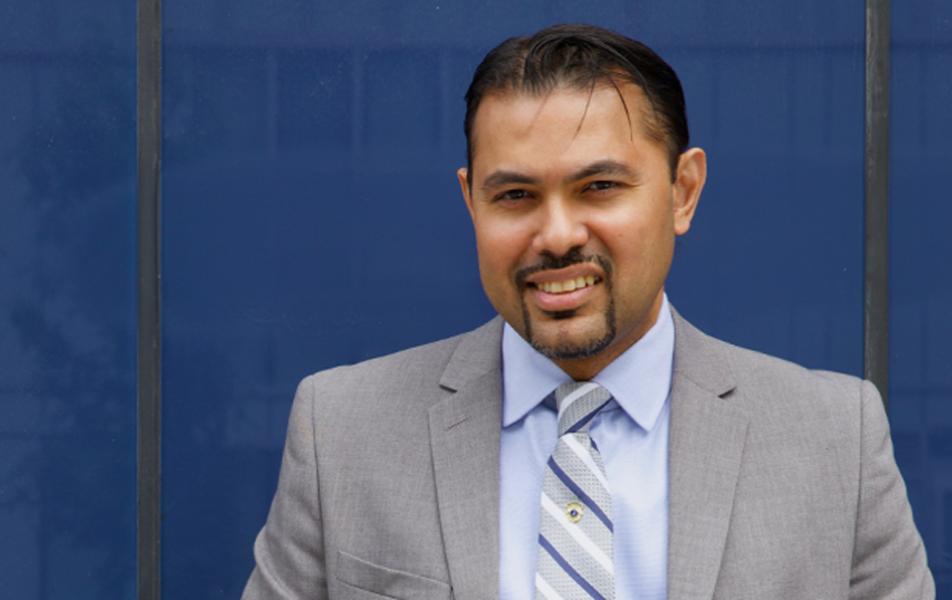
M.Ed. in Educational Leadership specializing in Leadership in Learning
Build a career navigating challenges, championing initiatives, and leading transformative change in post-secondary education, community education, corporate learning and development, and non-profit organizations.
Testimonials
FAQ
The online master’s degree program helps you advance your career in the training or teaching of adult learners, whether in the public, private or non-profit sectors, by equipping you with new professional skills and knowledge.
Despite being a fully online program, small class sizes and focused discussion forums promote interaction with professional peers and experienced faculty who understand education.
If you are looking to advance your career while studying from home or at work, the online degree can be completed in two years or less with approved transfer credits.
The MEd in Adult Education focuses on the theory and practice of instructing and learning for adult learners in a variety of work environments.
The MEd in Educational Leadership focuses on leadership and driving initiatives in educational organizations, including K-12 education and non-school-based learning environments.
Please see here for current tuition rates. Yorkville University is committed to helping you evaluate different financial aid options and payment schedules. Please contact an Admissions Advisor for more information.
Students can expect to dedicate approximately 16 to 20 hours per week to successfully complete the requirements for each academic course.
Please see here for more information or contact an Admissions Advisor if you have further questions.
Most participants in the MEd in Adult Education program are aged 30 to 45 years old and have significant professional experience in training and teaching of adult learners in a wide variety of workplace contexts. A small average class size of 18 students fosters participation and teamwork.
Yorkville University is a degree-granting institution in New Brunswick, Canada, and offers online and on-campus courses across the country. Yorkville University has been approved to offer the Master of Education degree by the Government of New Brunswick.
For more information on the minimum English language requirements, please contact an Admissions Advisor.
Yorkville University is committed to helping you evaluate different financial aid options and payment schedules. Please contact an Admissions Advisor for more information.
Only domestic students can apply to Canadian provincial student loan programs such as the Ontario Student Assistance Program (OSAP) or StudentAid BC.
Yorkville University is committed to helping you evaluate different financial aid options and payment schedules. Please contact an Admissions Advisor for more information.
If you can’t find your questions addressed on this web page, please contact an Admissions Advisor if you have additional questions.




